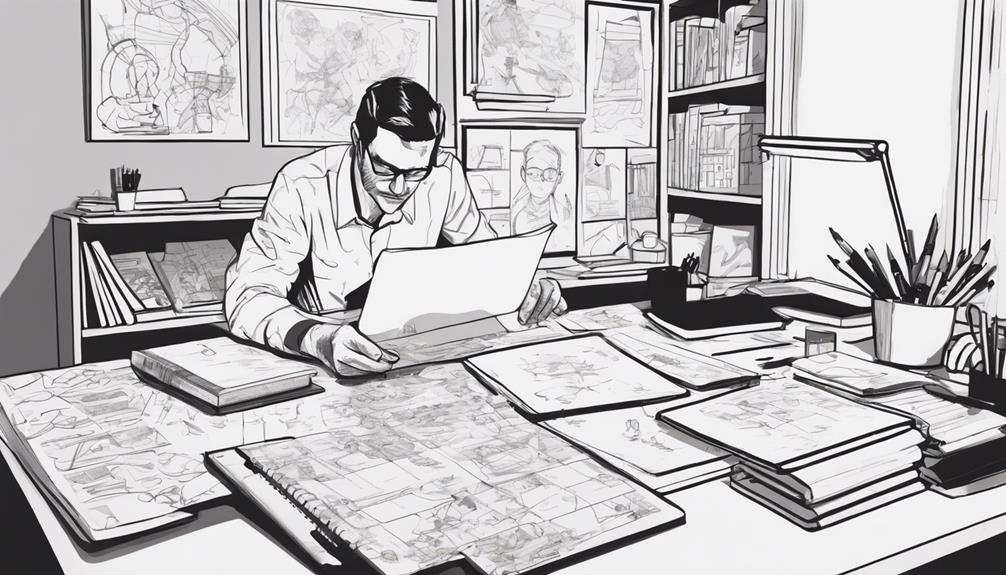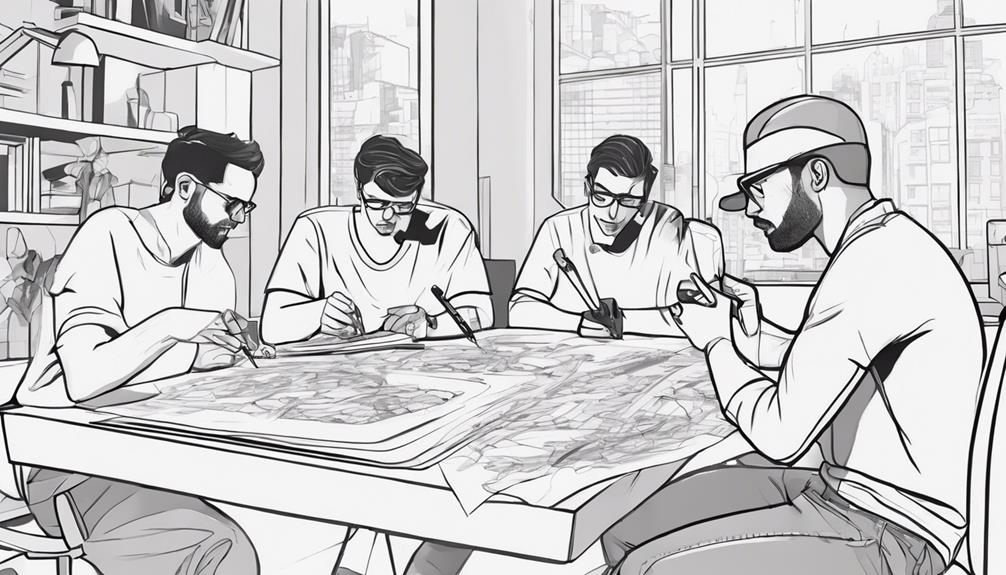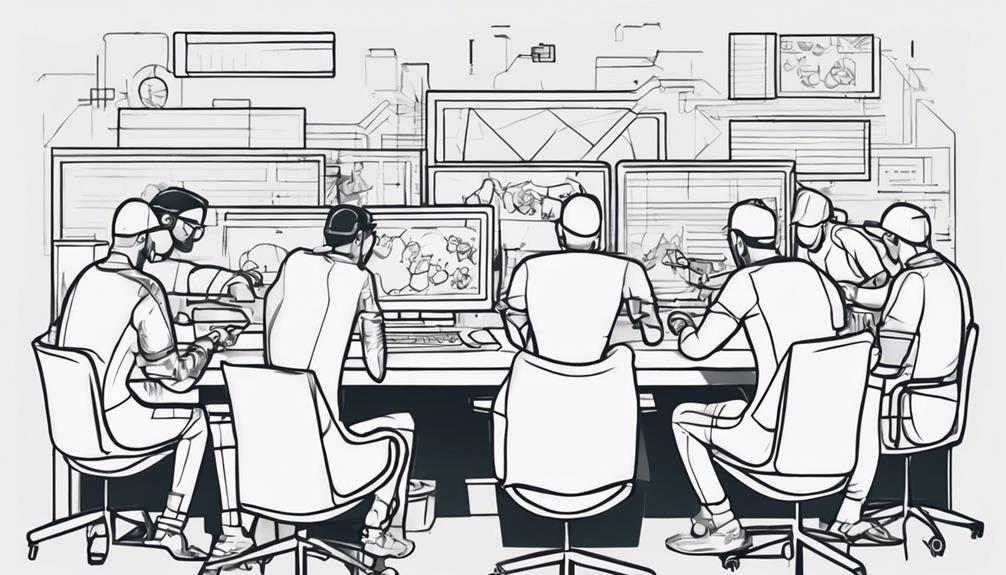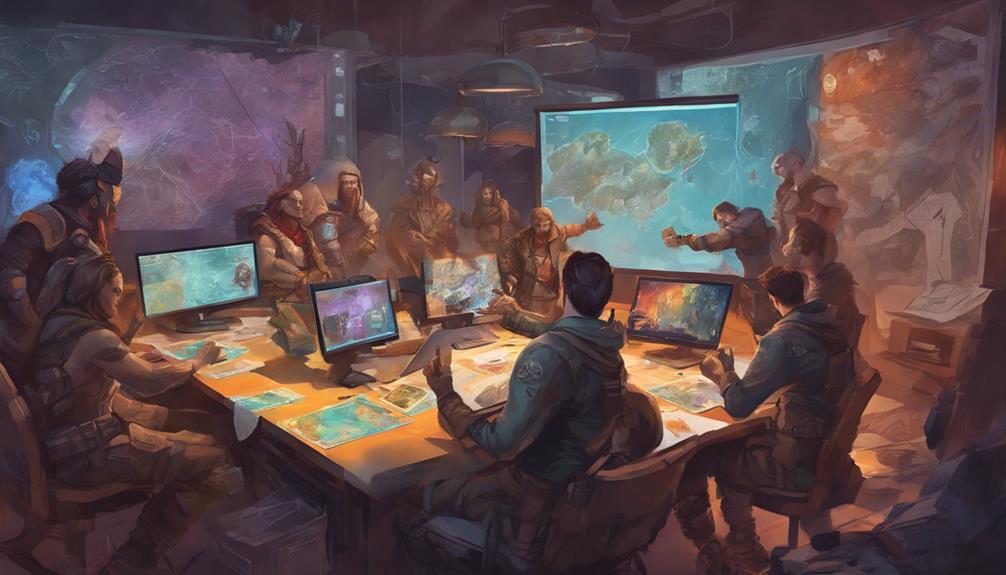The intricate process of creating video games involves a meticulous blend of creativity, technology, and expertise. From the initial stages of conceptualization to the final touches before launch, a diverse team of professionals collaborates to weave together a captivating virtual experience. But what truly lies beneath the surface of this complex and dynamic industry? How do these individuals navigate the challenges and complexities inherent in bringing a game to fruition? Let's explore the intricate web of processes and decisions that culminate in the games we love to play.
Key Takeaways
- Video games originate from a central concept blending story, characters, setting, and gameplay mechanics.
- Collaboration among professionals like writers, artists, designers, and programmers is crucial.
- Detailed game design documents serve as a roadmap for development teams.
- Strong narrative elements are vital for player engagement and immersion.
Conceptualizing the Game

The process of conceptualizing a video game involves distilling creative ideas into a cohesive narrative and gameplay framework that will captivate and immerse players in a compelling virtual world. Video games typically begin with a central concept that serves as the foundation for the entire game development process. This concept encompasses the core idea behind the game, including its storyline, characters, setting, and overall gameplay mechanics. Creating a successful game concept requires a deep understanding of storytelling principles, interactive design, and player engagement.
Game developers collaborate closely with writers, artists, designers, and programmers to flesh out the concept, bringing it to life through a combination of visual, narrative, and interactive elements. They explore multiple potential paths and intense gameplay scenarios to ensure that the game will not only entertain but also challenge and engage players. Strong narrative elements are essential for creating emotional bonds between players and the game characters, driving immersion and investment in the virtual world. In modern video games, interactive storytelling experiences have reached a level of sophistication comparable to movies, offering players a rich and dynamic narrative that responds to their choices and actions.
Assembling the Development Team
Drawing together a diverse array of skilled professionals is a critical step in the intricate process of creating a video game. A development team for a video game typically consists of professionals with various roles such as programmers, artists, designers, writers, and sound engineers. Each team member contributes to different aspects of the game development process, including gameplay mechanics, graphics, story, and sound. Collaboration among team members is crucial for the successful creation of a video game, requiring effective communication and coordination. The teams may vary in size and composition based on the scale and complexity of the game being developed, with larger projects often involving more specialized roles. The expertise and skills of the development team members play a significant role in determining the quality and success of the final video game product.
| Professionals | Roles | Skills |
|---|---|---|
| Programmers | Mechanics | Coding |
| Artists | Graphics | Design |
| Designers | Story | Creativity |
| Writers | Dialogue | Narrative |
| Sound Engineers | Sound | Audio Editing |
Planning and Preparing Assets

To progress from assembling the development team to planning and preparing assets for a video game, the initial phase involves creating a comprehensive game design document that delineates the gameplay mechanics, characters, story, and art style in meticulous detail. This document serves as a roadmap for the team, including concept artists who sketch character and environment designs, sound experts who work on sound effects and music, programmers who code the game mechanics, AI behavior, physics, and interactions, and level designers who craft the game's levels. Asset creation is a critical aspect of the development process, encompassing the development of 2D and 3D art assets, animations, sound effects, music, and level designs. Subsequently, the assets are prepared by optimizing and organizing them for efficient integration into the game engine. Each step in planning and preparing assets is essential to ensure the successful realization of the envisioned coin-operated video game.
Coding and Programming
Coding and programming in video game development are fundamental processes that involve the creation of game behavior and mechanics through lines of code. Programmers utilize languages such as C++, Java, and Python to build the game's functionality, implementing algorithms, AI, physics, and game logic. Debugging and testing play crucial roles in ensuring the smooth operation of the game, highlighting the significance of programming skills in crafting immersive gameplay experiences.
Game Design Process
Within the intricate realm of game design, the process of coding and programming plays a pivotal role in shaping the core functionality and mechanics of a video game.
- Programmers utilize languages like C++, Java, and Python to create the game's functionality and mechanics.
- Coding tasks encompass developing game physics, AI behavior, user interfaces, and networking features.
- Collaboration between programmers, game designers, and artists ensures the game meets design specifications and functions as intended.
Debugging and testing are vital phases in coding to pinpoint and resolve any issues or errors within the game's software. This meticulous process guarantees that the final product is polished and delivers an engaging gaming experience.
Software Development Tools
Software development tools are integral components in the process of coding and programming for video game development. Game developers utilize programming languages such as C++, Java, and Python to write the code that brings games to life. Game engines like Unity and Unreal Engine offer essential frameworks and tools that streamline the development process. Integrated Development Environments (IDEs) such as Visual Studio and Xcode provide a comprehensive platform for coding and debugging. These tools also offer libraries, APIs, and frameworks that enable software engineers to efficiently create and optimize games. By leveraging these software development tools, developers can enhance productivity, collaborate effectively, and ensure the successful execution of the game development process.
Debugging and Testing
In the realm of video game development, the meticulous process of debugging and testing plays a critical role in ensuring the seamless functionality and quality of the final product.
- Debugging: Identifying and rectifying errors or bugs in the code to maintain smooth gameplay.
- Testing: QA testers extensively play the game to detect glitches, inconsistencies, and gameplay issues.
- Quality Assurance: Rigorous testing procedures are implemented to uphold quality standards and ensure the game functions as intended.
Testing and Quality Assurance
In the realm of video game development, the bug identification process is crucial for ensuring the game's stability and performance. Compatibility testing methods are employed to validate the game's functionality across various platforms and devices. Quality control procedures play a fundamental role in maintaining high standards and enhancing the overall player experience.
Bug Identification Process
During the bug identification process in video game development, Quality Assurance testers play a crucial role in meticulously uncovering and documenting issues that could potentially impact gameplay experience.
- QA testers engage in rigorous gameplay to detect bugs, glitches, and game crashes.
- Testing involves identifying functionality issues that may hinder the player's experience.
- QA testers provide detailed reports on the bugs found, outlining steps to reproduce and severity levels.
This iterative process of bug identification and testing ensures that the game meets industry standards and player expectations for a smooth gaming experience. By conducting thorough examinations and reporting their findings, QA testers contribute significantly to enhancing the overall quality of the game.
Compatibility Testing Methods
Compatibility testing methods in video game development encompass a rigorous examination of the game's functionality across diverse platforms and devices to ensure seamless performance. This process involves testing the game on various hardware configurations, operating systems, and screen resolutions to guarantee it works correctly. Testers utilize emulators, simulators, real devices, and virtual machines to conduct comprehensive checks for issues related to graphics, sound, controls, and performance. By conducting compatibility testing, developers can identify and resolve any discrepancies that may arise when the game is played on different platforms. Ultimately, successful compatibility testing is crucial to delivering a consistent and optimized gaming experience for all players, regardless of the device or platform they choose.
Quality Control Procedures
Ensuring the quality and functionality of video games during development involves rigorous testing and quality assurance procedures to identify and resolve bugs and issues effectively.
- QA testers play a crucial role in ensuring the game meets quality standards and functions as intended.
- Testing includes functional testing, compatibility testing, performance testing, and regression testing.
- QA testers document and report issues, work closely with developers to resolve them, and retest the fixes.
Quality assurance is an ongoing process throughout game development, aiming to deliver a polished and bug-free gaming experience. By conducting various tests and working collaboratively, QA testers and developers ensure that the final product meets the desired quality standards.
Iterating and Refining Gameplay
Iterating and refining gameplay in video game development involves the meticulous process of making incremental adjustments to game mechanics, controls, and features to enhance player experience. This iterative refinement is essential for achieving optimal player engagement and satisfaction. During this phase, developers conduct extensive testing with focus groups, alpha and beta testers, and gather feedback to identify areas that require improvement. Balancing difficulty levels and pacing is crucial to ensure that the gameplay remains challenging yet enjoyable. By analyzing player data, utilizing analytics, and studying player behavior, developers can make informed decisions to enhance various gameplay elements.
The goal of iterating and refining gameplay is to create a cohesive and immersive experience that meets player expectations. This process allows for continuous improvement and adjustment until the game achieves the desired level of quality. Through iterative refinement, developers can address issues, fine-tune mechanics, and optimize gameplay to deliver an enjoyable and engaging experience for players.
Finalizing and Polishing the Game

In the finalization and polishing stage of video game development, meticulous attention is dedicated to testing for bugs, optimizing performance, refining graphics, and enhancing sound effects to ensure a seamless player experience. Quality assurance teams play a vital role in conducting rigorous testing to identify and rectify any bugs or glitches that could potentially impact gameplay. Iterative refinement during this phase focuses on enhancing game mechanics, balancing difficulty levels, and addressing player feedback to improve overall usability. The finalization and polishing stage are critical for ensuring that the game meets industry standards and is ready for release, requiring a high level of attention to detail on every aspect of the game's design and functionality.
- Extensive testing for bugs and glitches
- Optimizing performance and refining graphics
- Enhancing sound effects for a smoother player experience
Launching and Marketing the Game
Upon completion of the finalization and polishing stage, the focus shifts towards the strategic deployment of marketing tactics and the meticulous orchestration of the game's launch into the competitive gaming market. Marketing strategies play a crucial role in creating anticipation for the game, utilizing trailers, demos, social media campaigns, and press releases. Launch events are organized to generate excitement, often featuring giveaways, contests, and special promotions to attract players. Game distribution is facilitated through digital platforms such as Steam, PlayStation Store, and Xbox Live, as well as physical copies in retail stores. Reviews from critics and influencers significantly impact the game's reputation and success post-launch. Post-launch support is essential for maintaining player interest and satisfaction, involving updates, patches, DLCs (Downloadable Content), and community engagement. The table below summarizes key elements in the launching and marketing of video games:
| Marketing Strategies | Game Distribution | Post-Launch Support |
|---|---|---|
| Trailers | Digital Platforms | DLCs |
| Press Releases | Physical Copies | Community Engagement |
| Special Promotions | Updates & Patches |
Frequently Asked Questions
How Video Game Are Made Step by Step?
In the step-by-step process of creating video games, key phases include storyboarding, character development, environment design, playtesting, art direction, sound design, programming challenges, animation creation, level design, and marketing strategies. Each phase contributes to the overall quality and success of the game by ensuring engaging gameplay, appealing visuals, and a coherent narrative. Collaboration among various teams and adherence to project timelines are crucial for a successful game development process.
How Are Video Games Coded?
Coding in video game development involves utilizing programming languages like C++, Java, and Python to implement game mechanics, AI behaviors, and user interfaces. Developers leverage game engines, programming techniques, and algorithm design to create interactive experiences. The debugging process is crucial for ensuring smooth gameplay and performance. Game architecture, development tools, and coding challenges play vital roles in the software development process, enabling the translation of ideas into playable games.
How Do Game Developers Make Games?
Game developers create games by utilizing game engines for coding, graphic design for visuals, playtesting feedback for quality assurance, storyboarding for narrative structure, sound effects for immersive experiences, character development for engaging protagonists, user interface for player interaction, game mechanics for gameplay dynamics, marketing strategies for promotion, and monetization models for revenue generation. These elements merge systematically to bring a game idea from concept to reality, showcasing the intricate process of game development.
What Are the 7 Game Design Rules?
Game design rules are essential for ensuring player engagement, defining game mechanics, storytelling techniques, user experience, level design, art direction, and sound design. These rules also encompass the playtesting process, monetization strategies, and incorporating community feedback. Adhering to these rules leads to well-balanced and enjoyable gameplay experiences that resonate with players. By following these guidelines, game developers can create immersive worlds and compelling interactions that captivate audiences.
Conclusion
In conclusion, the process of creating video games involves a meticulous and collaborative effort from a team of professionals with diverse skills. The intricate process is akin to a symphony, where each individual contributes their expertise to compose a harmonious and immersive gaming experience for players. The attention to detail, creativity, and technical proficiency required in game development ensures that the final product is a seamless and engaging interactive experience for gamers worldwide.
